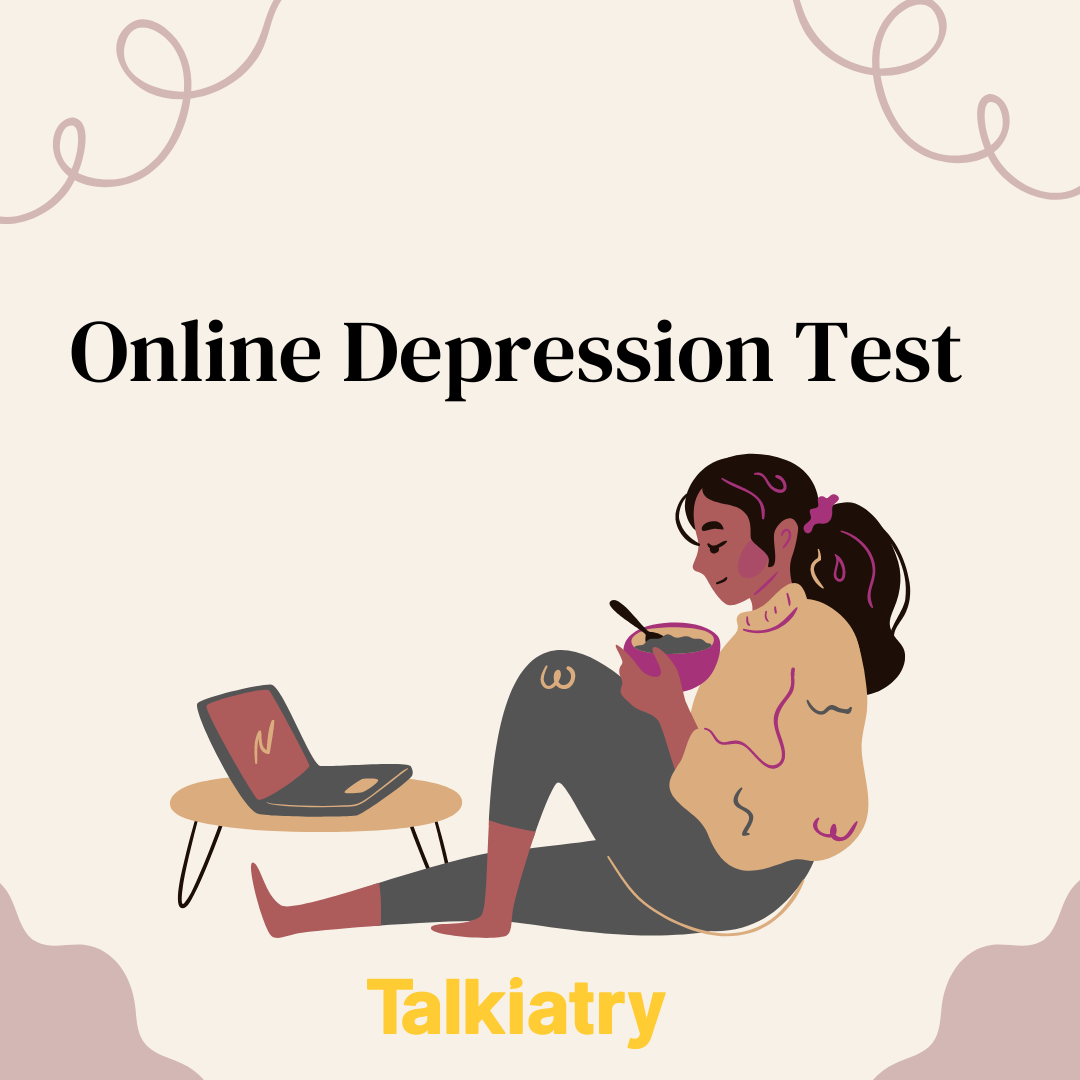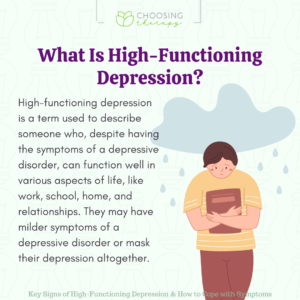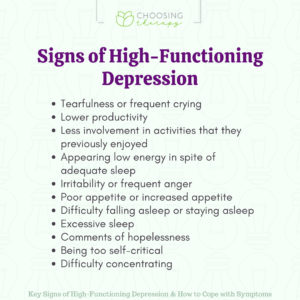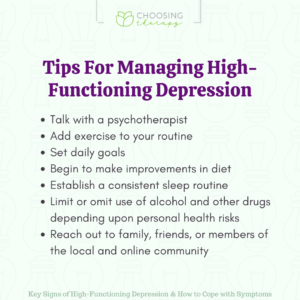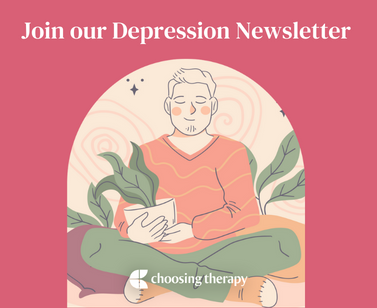High-functioning depression is a non-clinical label for a form of depression that isn’t necessarily severe enough to be diagnosed as clinical. Someone with functional depression might have low mood or lack of motivation while still being able to complete daily obligations. It is still important to rule out other forms of depression and mental illness, especially if they have thoughts of self-harm or suicide.
Depression Is Treatable With Therapy
Would you like to feel more happiness and joy? BetterHelp has over 20,000 licensed therapists who provide convenient and affordable online therapy. BetterHelp starts at $65 per week. Take a Free Online Assessment and get matched with the right therapist for you.
What Is Depression?
Depression involves a low mood, sadness, and feelings of hopelessness. It can also come with feelings of tiredness, focusing on the negative, and thoughts of self-harm. Depression is marked by a chronic sense of low feeling even during a period of high anxiety.
What Is High-Functioning Depression?
High-functioning depression is a term used to describe someone who, despite having the symptoms of a depressive disorder, can function well in various aspects of life, like work, school, home, and relationships. They may have milder symptoms of a depressive disorder or mask their depression altogether. This form of depression may also be called walking depression.
Persistent Depressive Disorder (PDD)
Someone who is high functioning but also has symptoms of low mood may be experiencing a mild version of persistent depressive disorder (PDD), which is diagnosable and treatable. PDD, formally called dysthymic disorder, involves long-term depressive symptoms that seem to be consistent and steady.
Major Depressive Disorder (MDD)
High-functioning depression may be related to an episode of major depressive disorder (MDD). A person could have major depressive symptoms but still function well for a period. Over time, though, major depressive episodes will make functioning at a high level very difficult.
Signs of High-Functioning Depression
The high-functioning depressed person may always have a smile on (sometimes referred to as smiling depression), but that doesn’t change their mental health. Underneath, they may experience hopelessness, irritability, poor appetite, etc.
High-functioning depression symptoms and signs include:1,2
- Tearfulness or frequent crying
- Lower productivity or decrease in overall activity
- Less involvement in activities that they previously enjoyed
- Appearing low energy in spite of adequate sleep
- Irritability or frequent anger
- Poor appetite or increased appetite
- Difficulty falling asleep or staying asleep
- Excessive sleep, more than 10 hours daily for teens
- Comments of hopelessness
- Being too self-critical
- Statements of feeling sad, down, or empty
- Difficulty concentrating
- Frequent comments of regrets about the past
What It Feels Like to Have High-Functioning Depression
High-functioning depression may feel like being sad or having low energy but still doing what needs to be done. You might be thinking: “I can do this. I can push myself to get through this day. People are counting on me, so I’ll do what I have to do.” It is not a distinct clinical diagnosis and may be a sign of a particular form of depression, such as PDD or MDD.
In addition, you may have one or more of the following symptoms:2
- Feelings of worthlessness or guilt
- Persistent negative thoughts
- Difficulty focusing at work, school, or home
- Feeling irritable or easily annoyed by others
- Feeling agitated or restless (e.g., agitated depression)
- Loss of interest in social activities
- Increased hours of sleep
- Tiredness, lethargy, in spite of adequate sleep
- Thoughts of death or suicide
- Depression & weight gain
- Unintentional weight loss
- Frequent tearfulness or crying
Help For Depression
BetterHelp – Get help from a licensed therapist. BetterHelp offers convenient and affordable online therapy starting at $65 per week. Free Assessment
Talkspace – Online Therapy With Or Without Insurance. Talkspace accepts many insurance plans including Optum, Cigna, and Aetna. Typical co-pay is $30, but often less. Get started
Who Does High-functioning Depression Affect?
High functioning depression can affect people at any age. Depression in college students happens just as it happens to professionals, stay-at-home moms, retirees, and everyone in between.
6 Signs of Functional Depression In Children & Teens
Childhood depression is easily missed since children are less likely than older teens and adults to express their feelings in words. In those instances, it is important to note changes in children’s behavior.
Six common signs of teen depression and depression in children include:3
- Physical complaints, such as aches, pains
- Restlessness or agitated behavior
- Distress when separating from parents
- Loss of interest in activities they usually enjoy
- Decline in school performance, possibly due to difficulty concentrating
- Comments about running away from home
The Risks of Functional Depression
People with high-functioning depression may find themselves stuck in the middle, so to speak. They could be too “well” to actively display their symptoms, but too “unwell” to easily maintain their relationships and responsibility. High-functioning depression is more desirable than severe, chronic depression, but high-functioning people encounter a unique set of challenges.
The risks of functional depression include:
- Some people minimize their issues: people with high-functioning depression may not want to recognize or acknowledge their needs and struggles
- Some people feel they should not be depressed: they may feel that the issues are “all in their head” or they just need to “snap out of it” to find relief. Unfortunately, this tendency towards guilt and shame only maintains and worsens their depression, keeping them stuck in their situation.
- Some treatment teams may not prioritize concerns: on the surface, they may not present as the “average person with depression,” which can confuse friends, coworkers, loved ones, and professionals
Depression Is Treatable With Therapy
Would you like to feel more happiness and joy? BetterHelp has over 20,000 licensed therapists who provide convenient and affordable online therapy. BetterHelp starts at $65 per week. Take a Free Online Assessment and get matched with the right therapist for you.
Potential Causes of High-Functioning Depression
In general, the common triggers or causes of high-functioning depression are similar to triggers of any form of depression. Possible causes range from a genetic disposition to an event-triggered depression.2
Potential causes and triggers of high-functioning depression include:
- High levels of stress related to demands of work, school, family, and home
- Financial problems
- History of trauma, such as loss of a loved one, emotional abuse, or being bullied
- Inherited traits that create a predisposition to become depressed
- Biochemistry, particularly an imbalance of any of the neurotransmitters related to mood stability
- Medical illness or chronic pain
- Relationship conflicts at home, school, or work
- Misuse of substances that affect mood or level of functioning
- Chronic fear due to living in an unsafe environment
7 Tips For Managing High-Functioning Depression
Changes in lifestyle are very often helpful for individuals who are coping with any form of depressed mood. These lifestyle changes may include changes in diet, exercise, sleep routine, use of substances, and involvement with a social support network.
Since it is common for people with depression to have difficulty initiating new behaviors, a recommended first step is to seek the help of a mental health professional who will be supportive and help you make the changes that will be the most beneficial.
Here are seven tips to lessen depressive symptoms:2
- Contact a psychotherapist: schedule an initial meeting as soon as possible
- Add exercise to your routine: under physician’s advice, add exercise to your daily routine. Physical activity has been strongly linked to improved mental health and mood for all ages. This is particularly true for persons with chronic mild depression such as PDD, and for depression related to chronic anxiety.5
- Set daily goals: set regular goals, preferably simple ones that are easily reached, in order to boost self-confidence and sense of accomplishment
- Begin to make improvements in diet: these changes should coincide with more energy, less sluggishness, and improved focus
- Establish a routine for sleep and waking: healthy sleeping habits contribute to improved mood and overall health
- Limit or omit use of alcohol and other drugs depending upon personal health risks: seek support for recovery from substance abuse if needed.
- Reach out to family, friends, or members of the local and online community: loved ones or proper organizations can offer emotional support
Would you like to be evaluated for depression? Virtual psychiatry for depression. Talkiatry offers personalized care with medication and additional support. They take insurance, too. Get started with our short assessment.
Treatments For High-Functioning Depression
To determine the most effective treatment for high-functioning depression, it’s crucial to get an accurate assessment of your symptoms. Usually, some combination of psychotherapy, medication, and/or lifestyle changes is effective for coping with functional problems.
Psychotherapy For Depression
Types of psychotherapy for depression include CBT, person-centered therapy, psychodynamic therapy, and solution-focused therapy.
Here are several common modalities of depression therapy:
- Cognitive behavioral therapy (CBT): CBT for depression is an effective treatment that involves making changes in both the patterns of negative thoughts and behavioral routines that affect the daily life of the depressed person3
- Person centered therapy: person centered therapy is a strategy that allows and encourages clients to understand and resolve their concerns in a safe, supportive environment.
- Psychodynamic therapy: psychodynamic therapy is a style that investigates the role of the unconscious mind depression
- Solution focused therapy: solution focused therapy is an approach interested in solutions which can be quickly implemented with a simple first step leading to further positive consequences
Medication For Depression
Some individuals who experience high-functioning depression may be having symptoms severe enough to warrant use of medication for depression.
There are five basic types of antidepressants, categorized as follows:
- Selective Serotonin Reuptake Inhibitors (SSRIs)
- Serotonin-Norepinephrine Reuptake Inhibitors (SNRIs)
- Tricyclics
- Monoamine Oxidase Inhibitors (MAOIs)
- Atypical Antidepressants
It is not unusual for the first trial of medication to be unsuccessful due to variability in how antidepressants can make you feel (i.e., lack of effect or intolerable side effects). It is very important to be open to a second or even third trial of antidepressants in order to find the most beneficial one.4
When & How to Seek Professional Help For High-functioning Depression
Because high-functioning depression can become a chronic problem, it’s always advisable to seek professional help for a functional depression. Typically, a person who functions at a high level in spite of having a depressed mood is a self-driven individual who has very high expectations of themself. They may find it difficult to ask for help or admit that they are struggling.
The same is true for those who identify with high functioning anxiety or any other disorder that has yet to breach their professional or public life yet.
Here are ways to get professional help for high-functioning depression, including:
- Ask a primary care physician for a referral to a psychotherapist
- Ask your health insurance company for a list of in-network mental health providers near you
- Use an online therapist directory to refine your search
- Contact the local community mental health center
How to Get Help For a Loved One With High-functioning Depression
If you’re dating someone with depression, or you become aware that a loved one is showing the signs of depression, there are several ways in which you may be able to help. Simply listening to their thoughts and feelings is often the most helpful thing you can do as a friend or partner.
Consider the following ways to help a loved one with depression:
- Offer your emotional support, empathy, and encouragement
- Take time to be involved with them in activities they enjoy
- Offer hopeful thoughts and suggest optimistic or neutral outcomes to their problems
- Take any statements about death or suicidal ideation seriously
- Promote the benefits of professional help and help them find an acceptable provider
- Offer to accompany them to the appointment or remind them to go to the appointment
- For older teens and adults, share the national hotline numbers noted above for SAMSHA and for suicide prevention
- Call 9-1-1 if you feel that the situation is urgent and unsafe for your loved one
Final Thoughts on High-Functioning Depression
What you’re struggling with may be unique to you, but you’re not alone. If you are feeling that you may be dealing with high-functioning depression, talking to a therapist or reaching out to a trusted friend or family member can make a big difference in how you feel.
Additional Resources
To help our readers take the next step in their mental health journey, Choosing Therapy has partnered with leaders in mental health and wellness. Choosing Therapy is compensated for marketing by the companies included below.
Talk Therapy
Online-Therapy.com – Get support and guidance from a licensed therapist. Online-Therapy.com provides 45 minute weekly video sessions and unlimited text messaging with your therapist for only $64/week. Get Started
Online Psychiatry
Hims / Hers If you’re living with anxiety or depression, finding the right medication match may make all the difference. Connect with a licensed healthcare provider in just 12 – 48 hours. Explore FDA-approved treatment options and get free shipping, if prescribed. No insurance required. Get Started
Depression Newsletter
A free newsletter from Choosing Therapy for those impacted by depression. Get helpful tips and the latest information. Sign Up
Learn Anti-Stress & Relaxation Techniques
Mindfulness.com – Change your life by practicing mindfulness. In a few minutes a day, you can start developing mindfulness and meditation skills. Free Trial
Choosing Therapy Directory
You can search for therapists by specialty, experience, insurance, or price, and location. Find a therapist today.
For Further Reading
- Looking for an online therapy option? Learn more about Talkspace vs BetterHelp.
- Check out these helpful books on depression.
- Best Jobs for People With Depression
Online Depression Test A few questions from Talkiatry can help you understand your symptoms and give you a recommendation for what to do next. Best Online Psychiatry Services Online psychiatry, sometimes called telepsychiatry, platforms offer medication management by phone, video, or secure messaging for a variety of mental health conditions. In some cases, online psychiatry may be more affordable than seeing an in-person provider. Mental health treatment has expanded to include many online psychiatry and therapy services. With so many choices, it can feel overwhelming to find the one that is right for you.